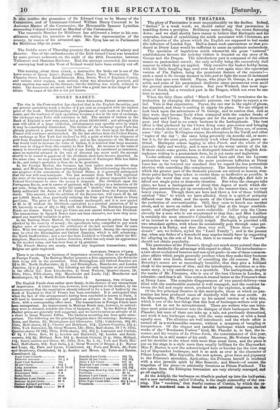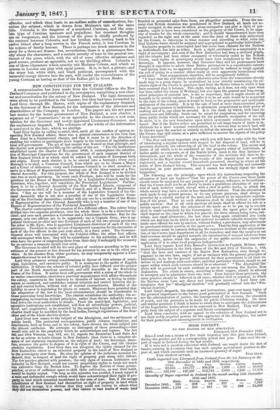THE THEATRES.
The glory of Pantomime is most unquestionably on the decline. Indeed,
"decline" is a weak word; we should rather say that pantomime Is tumbling down a precipice. Brilliancy seems fading; fun seems flattening down-' and we shall shortly have reason to believe that Harlequin and his comrades, instead of symbolizing the mirth associated with Christmas, are dull allegories of the gloom which the English are supposed to feel under the influence of London fogs. Half-a-dozen such pantomimes as that pro- duced at Drury Lane would be sufficient to cause an epidemic melancholy.
The specimen of lugubrious mirth wherewith the great " national" establishment favours the holyday visiters is founded on the story of St. George and the Dragon. The introductory part is composed of the oldest means on pantomimic record; the only novelty being the excessively dull manner in which they are applied. Only conceive the basket hobby-horse, with the little dangling legs, used over and over again since the equestrian version of The Tailors, being the prominent feature of the concern!— such a steed is St. George doomed to ride, and to fight the most ill-fashioned dragon that eyes ever beheld. Payne, who plays St. George, is a genuine artist, and some of his pantomimic drolleries cause amusement even amid the general atmosphere of dulness. But poor Wieland, that most inge- nious of fiends, has a wretched part in the Dragon, which not even he can turn to account.
When the fairy (here called " March of Intellect "!) terminates the in-
troduction by changing the dramatis personae, one begins to expect a re- lief. Vain is that expectation. Payne, the one star in the night of gloom, has departed, and there is nothing to supply his place. We are obliged to look back upon the adventures of St. George, and to confess that, dull as they were, they become lively when compared with the sombre freaks of Harlequin and Clown. The changes are for the most part in themselves poor, and they lead to no comic business in the harlequinade. The best effect is that produced by the Clown firing some gun-cotton and bringing down a whole shower of cats. And what a best effect! There are, of course, some " hits " at the Wellington statue, the alterations in the Tariff, and other "topics of the day "; the same being generally six months old, or more: but it is, for the most part, melancholy work when Pantomime grows sa- tirical. Harlequin comes lagging in after Punch, and the whole of the journals daily and weekly, and is seen to be the worst satirist of the let. If there exists some genius, born to distinguish himself as an English Aria- tophanes writing in a pantomimic form, he is yet mute and inglorious. Under ordinary circumstances, we Lula have said that the Lyceum pantomime was very bad; but the more ponderous infliction at Drury Lane has so far lowered our standard that we regard the less pretentious abortion with something like complacency. The introductory section, in which the greater part of the dramatis persons are attired as insects, won- drous pains having been taken to render them as ineffective as possible, is perhaps the worst that ever was contrived. The Butterfly's Boll fails to afford one single point or dramatic situation. But when the changes take place, we have a harlequinade of about that degree of merit which dis- tinguishes pantomimes got up occasionally in the summer-time, at no very heavy expense. Though there are here and there a few of those brilliant satirical " hits" to which we have alluded, there is a spirit of antiquity diffused over the affair, and the sports of the Clown and Pantaloon are the perfection of conventionality. Still, they seem to knock one another about, and to move on rather more briskly that at the larger establish- ment; and altogether they are more endurable. Collier acts the Clown cleverly for a man who is not accustomed to that line; and Miss Laidlaw is certainly the most attractive Columbine of the day, giving something of an interest to a character usually insipid. Harlequin is provided with two attendant sprites, with whom he occasionally goes through some per- formances a la Risley, and does them very well. These three "profes- sionals " are, we believe, styled the " Lauri Family "; and in the present day, when any father of a household may acquire family fame by supporting his offspring on the sole of his foot, there is no reason why the " Laurie should not obtain popularity.
The pantomime at the Princess's, though not much more pointed than the rest, has decidedly the advantage with regard to effect. The introduction...-. a tale about enchanted beauties and one-eyed genii—is one of those common- place affairs which people generally produce when they make fairy business out of their own heads, instead of consulting the old sources. But Mr. Beverley's scenes are so exceedingly beautiful, that they give a brilliant cloak to the meagreness of idea; and the introduction, worthless as a dra- matic story, is very satisfactory as a spectacle. The harlequinade, despite the merits of Mr. Flexmore, who is one of the best Clowns in London, ig tolerable—and that is all. Gun-cotton is treated better at the Princess's than at Drury Lane. The complete disappearance of two parcel-delivery-vans filled with the combustible material is well managed; and the contrast be- tween the full and empty street, produced by the explosion, is striking. Of the five principal theatres in this metropolis, those at which no pan- tomime has been produced came off decidedly with the most credit. At the Haymarket, Mr. Planate gives us his annual version of a fairy tale, which is one of the best things that this best of burlesque-writers ever pro- duced. Let us not be misunderstood. There are writers who can intro- duce more point and humour into the dialogue of their burlesques than Mr. Pismire; but none of them can take up a tale, not previously dramatized, and work it into burlesque shape, with the same neatness, or with a hand equally sure. The allusions are well introduced; and the whole affair is turned off in a workmanlike manner, without a symptom of bungling or inexperience. Of the elegant and tasteful burlesque which supplanted works of the " Bombastes Furioso " kind, Mr. Planchd is, in fact, the in- ventor and his version of Le Prince Lutin, the entertainment of this year, shows ;let he is still master of his craft. Moreover, Mr. Webster has clap- ped his shoulder to the wheel with more than usual force, and the piece is put on the stage in a style more than usually brilliant for the Haymarket. Miss P. Horton is now the acknowledged hero or heroine (as the case may be) of Haymarket burlesque; and is as arch as ever in the character of Prince Leander. Miss Reynold; the new actress, gives force and piquancy to the Princess's attendant, Apricotina; the Princess herself is rendered with s nice juvenile spirit by Miss Bennett; and Bland—of course the tragedian of the piece—is admirably ferocious as Prince Furibond. The airs taken from the Ethiopian Serenaders are very cleverly managed, and go off capitally.
At the Adelphi, the burlesque on Giselle is pushed up into the half-price; and a new melodrama, called Colombo, is the staple commodity of the eve- ning. The " vendetta," that fearful custom of Corsica, by which the re- lative of a murdered man is bound to take personal vengeance on rho offender, and which thus leads to an endless series of assassinations, fur- nishes the subject; which is drawn from Merimee's tale of the same title. Colombo is the daughter of a murdered Corsican, and the corn- lete type of Corsican manners and prejudices: her constant thoughts are on vengeance; and the interest of the piece is chiefly produced by the contrast between Colombo and her brother, who, coming back to his native island after a long service in the French army, is less Corsican in his notions of family honour. There is perhaps too much sameness in the story for a three-act drama: but, nevertheless, there is a picturesque fero- city about the characters, and a certain novelty of tone in the general sen- timent of the piece, which, with the aid of some effective situations and good scenes, produce an agreeable, not to say thrilling effect. Colombo is one of those characters which exactly suit Madame Celeste, and which no actress in London can play with equal power. It is, in fact, a picture; and the straw hat, white shirt, and black petticoat, accompanied with the mournful energy thrown into the part, will render the remembrance of the young Corsican as lasting as that of the Indian girl in Green Bushes.































 Previous page
Previous page